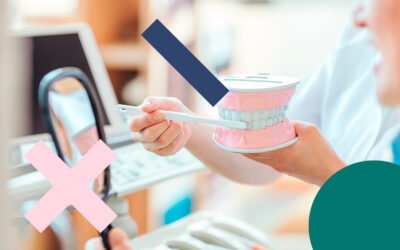Due to today's lifestyle, one of the main reasons for toothache is stress. The symptoms of anxiety in many people manifest themselves through different oral pathologies, such as bruxism, inflammation of the temporomandibular joint, and even periodontal disease.
What causes stress-related toothache and how does it affect oral health? Find out how stress usually manifests itself in the oral cavity, the most common symptoms, how to prevent it and how to treat it in the most appropriate way.
What is the relationship between stress and toothache?
Stress has very negative health consequences. It can manifest itself in many ways in the body, one of the most common being toothache due to nerves.
People who suffer from stress or who are going through a period of anxiety often notice that their teeth, jaw and gums suffer from different ailments. Stress and toothache often go hand in hand, increasing over time if the problem is not solved.
In most patients suffering from stress-related toothache, the main cause is tooth grinding or pressure exerted by clenching the jaw. The affected person is not aware of these habits, which can deteriorate the health of teeth and gums over time.
How does stress affect oral health?
Due to stress, it is often the case that the upper teeth spend more time in contact with the lower teeth. In a healthy, relaxed position there is some separation between the upper and lower arches, avoiding tension on the joint and tooth surfaces.
Friction between the teeth causes constant wear of the enamel. This wear leads to increased tooth sensitivity, a greater likelihood of caries formation and, ultimately, tooth pain as the dentine is exposed.
Stress can affect the health of teeth and gums in different ways. Paying attention to possible manifestations of stress in our oral cavity and going to the dentist regularly, in most cases allows us to detect the first signs of stress, preventing the appearance of ailments or their worsening.
Stress Bruxism
One of the main causes of bruxism is stress. This manifests itself through nervous tension in the mouth, increasing the pressure between the upper and lower teeth.
The problem with bruxism is that it can go unnoticed, especially when it is nocturnal bruxism. Among the most common symptoms are tooth wear, cracks in the enamel, tooth pain due to decay, and great tension in the jaw joint.
Stress gingivitis
Another of the most frequent disorders associated with stress is the appearance of periodontal diseases. Starting with gingivitis or inflammation of the gums, which over time can develop into chronic inflammation and spread to the structures that support the tooth (periodontium), leading to the destruction of the bone.
This inflammatory process is accompanied by red gums, bleeding and frequent discomfort in the mouth. When gum recession occurs, the dentine is exposed, increasing tooth sensitivity in affected patients.
Mouth sores due to stress
Under sustained stress, levels of the stress hormone cortisol rise above healthy levels. The immune system is affected, increasing the risk of canker sores or mouth sores on the gums, tongue and mucosa.
These rounded, whitish lesions are very annoying and can make it difficult to carry out daily activities such as talking, eating or proper oral hygiene. Maintain a healthy mouth with daily care routines.
Discover our products for daily oral care

Temporomandibular joint disorders
Stress is accompanied by a tendency to clench the jaw, directly affecting the temporomandibular joint. This joint is responsible for joining the mandible to the upper jaw and is located in the anteroinferior area with respect to the ears.
Problems opening and closing the mouth, jaw locking, temple pain, headache and even neck pain can be obvious symptoms of stress. They are often accompanied by toothache, or lead to increased tooth sensitivity due to progressive tooth wear and damage.
Stress caries
Closely linked to stress is the increased likelihood of tooth decay. In an advanced stage of dental caries, intense pain appears in the tooth when the infection reaches the dentine or the nerve.
Toothache caused by caries begins when the tooth comes into contact with very cold or hot food. Gradually, the tooth tissue is destroyed and the pain intensifies if it is not remedied immediately.
How to take care of your oral health?
The manifestation of stress-related toothache usually occurs when the level of involvement of the teeth is high. For this reason, it is important to visit the dentist regularly, in order to detect stress symptoms in time before they become serious.
Eating a healthy diet, exercising, getting adequate sleep and avoiding unhealthy habits are other guidelines to avoid stress and associated toothache.


 How to relieve pain with newly placed braces?
How to relieve pain with newly placed braces? How to keep your breath fresh?
How to keep your breath fresh? 10 Tips to take care of the oral health of the little ones
10 Tips to take care of the oral health of the little ones




